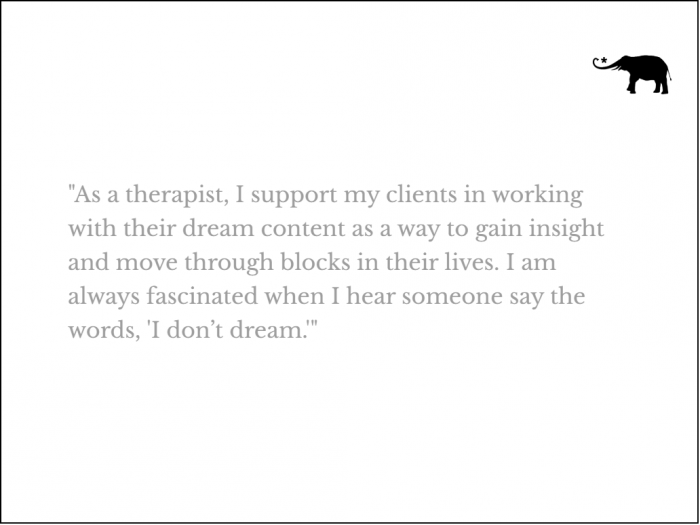“Being imbued with a vividly active imagination, still, I have brilliantly Technicolor dreams. They’re very, very strong. The ‘what if?’ approach to life has always been such a part of my personal mythology, and it’s always been easy for me to fantasize a parallel existence with whatever’s going on. I suspect that dreams are an integral part of existence, with far more use for us than we’ve made of them, really. I’m quite Jungian about that. The dream state is a strong, active, potent force in our lives.
The fine line between the dream state and reality is at times, for me, quite grey. Combining the two, the place where the two worlds come together, has been important in some of the things I’ve written, yes.” ~ David Bowie
I have always felt a strong affinity for David Bowie because of his connection to dreams.
I dream in brilliantly Technicolor dreams as well, and I have always derived huge inspiration and trust from them.
As a therapist, I support my clients in working with their dream content as a way to gain insight and move through blocks in their lives. I am always fascinated when I hear someone say the words, “I don’t dream.”
There is a little part of my heart that sinks every time I hear someone say this, because I think our dream world is an important and intimate part of our psyche that tries to communicate with us, when we are deep in slumber.
I do trust that anyone who wants to access their dreams can do it.
We can all access our unconscious. It manifests itself through the language of symbols and has two pathways—imagination and dreams.
Carl Jung was a Swiss psychiatrist and psychotherapist who founded analytic psychology. He believed that the unconscious mind is the creative source of all that evolves into the conscious mind and into the total personality of each individual. He believed that both parts of the mind (conscious and unconscious) have critical roles to play in the equilibrium of the total self.
If they are out of balance with each other, neurosis or other disturbances of the mind and body can be the result.
Part of our task then, is to connect deeply with both our unconscious and conscious mind and bring awareness and connection to their messages. If we don’t understand our unconscious influences, we are at risk for playing out old roles, listening to outdated soundtracks or reacting to our present from an unhelpful place. We can do damage in our personal lives if we are shut off from this major source of self.
A Four Step Approach to Dream Analysis:
1. Making associations.
What was the first image that appeared in the dream?
What feelings or thoughts do you have about that image?
What words or ideas come to mind when you look at it?
2. Connecting dream images to inner dynamics.
What part of you does that part of the dream represent?
Where have you seen it functioning in your life lately?
3. Interpreting.
What is the central message of this dream? What is it trying to communicate to me?
What is it advising me to do?
4. Doing rituals to make the dream concrete.
Create small, symbolic act in response to the dream message (write about it in your journal, make a piece of art that represents your dream, put a totem in your pocket that represents the dream energy that you want to remember).
If you are still worried that you won’t be able to remember your dreams, or you want to increase your dream recall, here are a few useful hints:
Helpful Hints for Dream Recall:
1. Before you go to bed, clear your mind and then tell yourself you will remember your dream when you wake up, or ask yourself to remember your dream.
2. Before you open your eyes upon waking, recap what you can remember from your dream.
3. Keep a dream journal next to your bed—open with a pen waiting, or a voice recording device (your phone if that is easier). Immediately recap your dream as best as possible. Drawing pictures can also help if the images are strong. Write down whatever you can remember, even if it is just random words, colors or phrases that don’t seem to make sense in the moment—you will get something from it later!
4. Consistent sleep hygiene helps: Having a consistent bedtime and wake time and getting enough sleep are key. Not having to wake up to an alarm and rush is also helpful: wake up slowly, take your time with your precious unconscious mind, it deserves your attention. (Alcohol, drugs and medications can affect and interfere with dream recall.)
5. Don’t get discouraged! This is a practice that takes time. At first you may only remember snippets, but with practice it will increase and eventually you won’t have to even try at recall! It really works!
A great book for beginners to who want to dive deeper into dreamwork from a Jungian perspective is Inner Work: Using Dream and Active Imagination for Personal Growth by Robert A. Johnson.
~
Relephant:
The World is as We Dream It.
Author: Angela Merrill
Editor: Ashleigh Hitchcock







Read 0 comments and reply